#umineko meta
Text
I feel like Maria Ushiromiya is Umineko's litmus test for not only your general empathy towards children (because let's be honest, society doesn't regard kids as people deserving of respect) but also your reading comprehension and how far you've gotten into Umineko.
Anime onlies even from episode 1 have always notoriously applauded Rosa beating Maria for exhibiting "abnormal" or "annoying" behaviours and there's SO many meme gifs of a 9 year old being slapped (Rose garden scene). And even when they reach the adaption of Maria's backstory arc, you'll always see people yet again claiming "She deserved it" or that Rosa was valid. These types of people generally dont believe in a child's autonomy, nor have empathy if that child is in some way irritating.
And for those that completely changed their mind and realised that Maria was actually someone that was a victim, they too aren't excused from their previous opinions of how Rosa treats her daughter. They still thought that since Maria was annoying, she deserved to be verbally and physically assaulted.
However when you talk to Umineko readers, you find that "population" of Maria haters remains niche or in consistent decline. This only becomes further cemented through the backstory arc in the novel (which imo was done far better than the anime), but this is also where the reading comprehension comes in.
Alot of the time, readers miss the point of Ryukishi's writing concerning Maria and settle on the idea that there's some sort of "grey area" regarding Rosa's treatment of her daughter. The novel explicitly explains that what she does is abhorrent and that it ISNT a morally grey subject matter.
I will also acknowledge that Ryukishi also explores Rosa's problems and perspectives too, of her own trauma that leads into the abuse of Maria, but never once does the narrative seek to excuse it or paint the situation as something other than truly cruel. It is a perfect expression of the cycle of abuse within families and as difficult it is to read/watch Rosa internally struggle with her guilt over her violence, she never actually changes her behavior.
If you cannot at least empathise with Maria, how on earth will you be able to understand the struggles of Beatrice, and the meaning behind the narrative itself?
#maria ushiromiya#rosa ushiromiya#umineko spoilers#umineko#when the seagulls cry#umineko when they cry#ryukishi07#maria umineko#umineko meta#meta#umineko analysis#umineko anime#when they cry#beatrice ushiromiya#golden witch beatrice#beatrice umineko
223 notes
·
View notes
Text
do we think asumu actually is emotionally manipulative and cunning or is she just the homer to kyrie's frank grimes
8 notes
·
View notes
Text
Between Magic and Mirrors
Would you believe me if I told you that this character

is like this
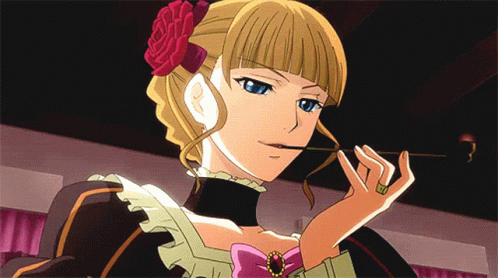
and this?
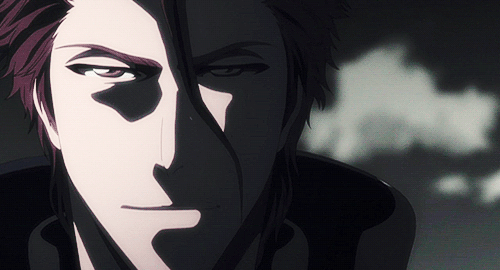
While I watched Neo in RWBY, I couldn't help but notice the similarities she has to Umineko's Beatrice and Bleach's Sosuke Aizen and I'll explain all of these in more detail here:
NEOPOLITAN AND BEATRICE - IMAGINATION, MAGIC AND ESCAPISM
Beatrice is a character of Umineko who is known to be the Golden Witch but her true identity is Sayo Yasuda, Kinzo's illegitimate daughter born by incest who after Natsuhi accidentally pushed the servant who was holding Sayo causing Sayo to lose her private parts, being saved by Genji and Kumasawa who raise her in secret to avoid another incestuous episode by Kinzo. This caused Sayo to have insecurities about herself and her own gender and to make matters worse the other maids start to pester her for her clumsiness in her work as a maid and her only friend was Kumasawa with whom she develops a love for mystery stories and magic in general. Sayo was unhappy and always alone so she started creating imaginary friends to make up for her loneliness and because of her love for magic she created Proto Beatrice (later know as Gaap) to explain her own clumsiness and later creates Shannon persona, the perfect servant girl. Sayo's imagination becomes her refuge but also her prison because it gave relief to her loneliness and made her feel good about herself but in turn this isolated her from others. Later she meets Battler and for the first time she doesn't feel lonely for long but due to her loneliness she trusts Battler too much to the point that she takes seriously Battler's promise that he would come back for her but when he doesn't come back which makes Sayo feel betrayed but to make matters worse she discovers her true identity as Kinzo's illegitimate daughter, she goes mad, takes Beatrice persona as her own and think that she's a real witch.
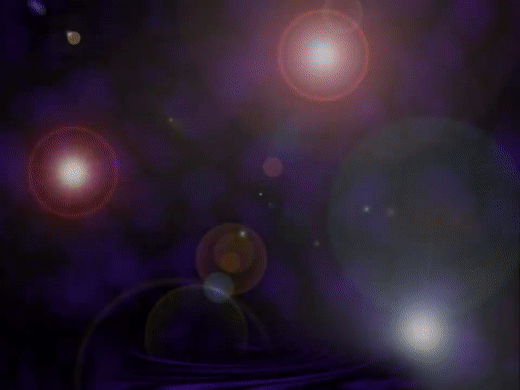
Later Sayo causes Rokenjima incident as a way to get revenge on the family that hurt her and especially Battler for leaving her alone but in turn she feels bad for everything she has done and chooses to commit suicide by drowning in the sea.
In the meta world Beatrice plays the killing games with Battler so that he knows that the reason for the Rokenjima incident is so that he would remember the promise he made to her when she was Sayo.
Do you know who more was born in a rich and toxic family that hurt her for her disability, used her imagination as a form of freedom and escapism and ended up loving a man just so that when that man disappears she goes mad and seeks revenge as a result?
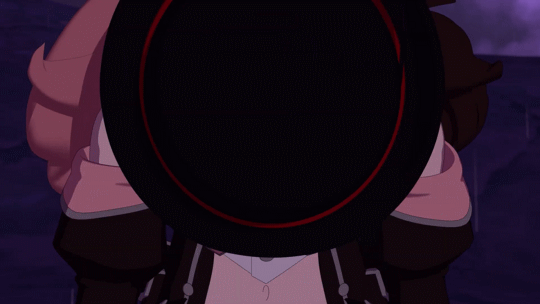
Beatrice and Neo are adults who act like children so they lash out at others but they don't take responsibility for their actions nor do they realize how their actions hurt others, they only care about their own pain. This is even seen when Sayo and Trivia create their imaginary friends (Gaap or Proto Beatrice and Pink Neopolitan) not only to feel accompanied but also to blame them for their mistakes.
Beatrice's actions led to the terrible situation that Eva was forced to live in as the sole survivor of her family and having to deal with the media accusation that she killed everyone on the island when in fact Eva was suffering for the loss of her husband Hideyoshi and her son George and the rejection of Ange and Ange herself had to endure being bullied at school for being the daughter of Rudolf and Kyrie, alleged murderers of Rokenjima, and also in her desire for her parents to return, rejected Eva believing that her parents and brother would come back for her. Battler was also hurt by Beatrice's actions because by trying to follow her and stay with her in her death, he survives but doesn't remember anything and is found by Ikuko Hachiyo who he marries and is tormented by memories that come to him through nightmares. Neo for her part wants revenge against Cinder but she is manipulated for her to help her and unload her anger against Ruby which makes Neo help Cinder to destroy an entire kingdom without mentioning that her actions are indirectly helping Salem to destroy the world because Salem's plan is to make the world a chaotic place so that when the Brother Gods are summoned they will destroy the world as a result of the chaos that exists.
Another thing that both have in common is their powers and how both are based on the manipulation of reality through imagination to some extent. Beatrice is a witch whose powers basically consist of making what she imagines come true, forcing reality to make what she believes to be real be real because Sayo, her true identity, dealt with loneliness through her imagination. The above can be seen from the fact that she didn't ask to revive Sakutaro because she believed that Rosa denied it but Angel revives him simply because she believed that Sakutaro was alive by having a spare stuffed animal.
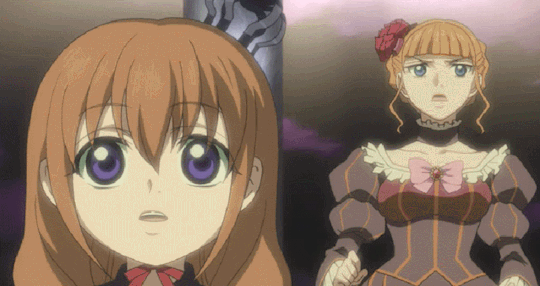
Neo's semblance allows her to manifest whatever she imagines into reality in illusions made of glass that everyone can see.
Both powers force reality to operate under the rules of Beatrice and Neo and even said powers are enhanced in places linked to the imagination (the Golden Land is a kingdom created by Beatrice where everything she thinks comes true and Neo is in Ever After, a magical place where it reflects the psyche of the characters and therefore also reflects the imagination). Beatrice's golden magic and Neo's semblance are perfect powers for a lonely and imaginative child and for deadly assassins, imagination is a double-edged sword because although Beatrice and Neo deal with their loneliness with their imagination (they create imaginary friends) and it gives them the freedom they feel they don't have with their original identities (Beatrice - Sayo Yasuda, Neopolitan - Trivia Vanille) in turn they get stuck in their own heads who just can't accept reality and instead look for reality to be as they want or believe it should be.
Beatrice and Neo are witches, Beatrice, as I said before, is the Golden Witch and Neopolitan is based on Trivia, the Roman goddess of witchcraft and there is something interesting about the concept of a witch in Umineko which is that a person becomes a witch by feeling rejection of their reality but they puts aside their humanity and their ties to other people and this also applies in RWBY: Sayo couldn't stand her life as a human and took the identity of Beatrice to feel free and take revenge and in the end she ends up in the Golden Land and in RWBY while team RWBY looks to get out of Ever After and Jaune can't get out until he gets help, Neo seems rather comfortable in Ever After and may even want to stay there.

Beatrice dies in real life not accepting the blame for her actions and ends up alone in the Golden Land until the end of Umineko where Battler finally reunites with her and Neo is running the risk of ending up just like Beatrice: ending up as a lonely witch in an imaginary world.
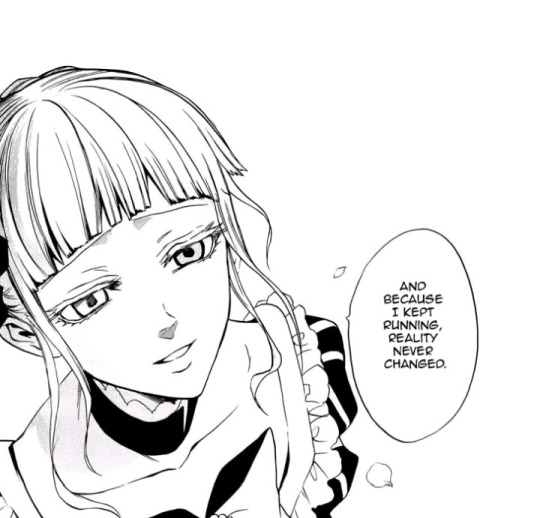
NEOPOLITAN AND SOSUKE AIZEN - LIVING MIRRORS
If there is something we know about Neo, it is how she is essentially a living mirror, not only because she creates illusions made of glass that everyone can see, but also because she is a mirror for the characters, especially for Ruby, but they know that another character curiously share these same traits with Neo?

Sosuke Aizen is a character from Bleach and one of the main antagonists of the manga. Not only does he share some physical similarities with Neo, but his powers are illusions visible to all who have seen his Shikai's activation and something curious is that Neo's and Aizen's illusions are made of glass.

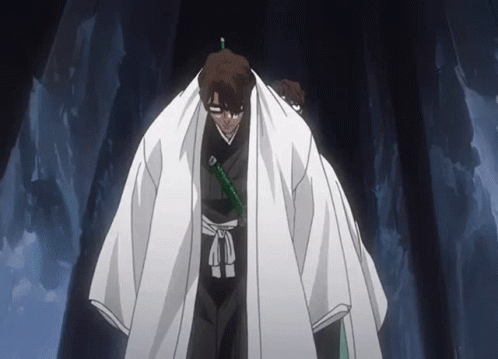
Glass is an element that in fiction represents fragility, which gives us clues that Aizen and Neo's senses of identity are as fragile as glass itself: Aizen's identity is fragile because it is only based on what he can do (his intellect and his powers) to the point that he feels that morality does not apply to him, he feels that only he can change and rule the Soul Society and Ichigo even speculates that the reason Aizen wanted to conquer Soul Society was because of his desire for an equal, that his extreme power and intelligence only served to isolate him from the moment he was born (this can be seen in his effort to strengthen Ichigo as well as his respect for Kisuke Urahara stems from seeing them as equals) and Neo feels oppressed by her own family for not accepting her because of her disability and she unconsciously feels that no one is going to accept her and takes refuge in her idealized identity (Neopolitan) where she is powerful and free to do what she wants without being nobody oppresses her but she defines herself only by her bond with Roman (after their relationship goes from transactional to something genuine, Roman is the only one who respects her and wants her) and her life as a criminal that gives her freedom makes her dependent on Roman and unable to form bonds with others. Aizen and Neo were born with physical and/or mental conditions (Aizen - high intellect and enormous spiritual pressure and Neo - muteness and her semblance) that made them feel different from others, which caused their actions and their identity to be based on said conditions to the point that their powers they serve to reflect that sense of self that both have of themselves: sharp but fragile.
Aizen and Neo not only have a glass motif because of their fragile sense of self but also because they are mirrors that reflect the characters.
Aizen is a reflects that reflects Kisuke, Toshiro, Starrk and even Ichigo himself:
Aizen reflects Kisuke because they are both renowned geniuses for their great intellect and even looking to create something new just because they could just because Kisuke has moral boundaries that he dares not cross and Aizen just doesn't care about morals.
Aizen reflects Toshiro in the sense that they were both born prodigies having extremely enormous power and were ostracized because of it but Toshiro didn't let their power define him as a person but saw it as a part of himself and he managed to bond with the others while Aizen saw his power and intellect as his complete identity, which made him unable to have a bond with anyone.
Aizen reflects Starrk because they are both extremely powerful beings but this distanced them from each other because the others were weaker than them, making both wish they were weak in order to bond with others or meet people who were as strong as them or mlre. Starrk created Lilinette and found people (including Aizen himself) for him to be with without being overwhelmed by his power, relieving his loneliness while Aizen is unable to bond with anyone because he finds no one he considers an equal or that they are powerful enough that they are able to withstand his own power.
Aizen reflects Ichigo because they are both extremely powerful but both just want to be normal, the difference is that Ichigo knows that this is his wish, he expresses it openly and in the end lives a normal life with his family while Aizen does not recognize or realize it of that desire and seeks to be superior to others.
Neo is also a mirror that reflects other characters, in her case, Team RWBY and Jaune:
Neo reflects Ruby in that they both deal incorrectly with the loss of a loved one, refuse to examine themselves so they can't face said loss, and dress like said loved ones (Ruby wears clothing resembling the ones her mother Summer wore and Neo wears Roman's hat and gray cloth) to feel close to them and/or to feel that they are still alive in some way. Ruby suppresses everything she feels and decides to move on and Neo gets carried away by her emotions to the point that she doesn't care if she and others get hurt.
Neo reflects Weiss in the sense that they both grew up in a rich but toxic family and wanted to be free but Weiss grows as a person because she had the support of Winter and then she has the positive support of RWBY which allows when Weiss goes down in Ever After After losing her father and her home, she doesn't lash out at anyone but rather seeks to leave the place while Neo has no personal growth because she did not know anyone, she loses her parents who oppressed her and Roman is left, who does love her but his support it's not positive and when she loses him Neo gets angry and lashes out at others and doesn't seem to be concerned about staying in Ever After.
Neo reflects Blake because they were both born with conditions that make them different from the others (Blake is a Faunos and Neo is mute) and they were strongly discriminated for it and they both get together with a man (Adam and Roman) who lead them astray but they stay with them for accepting them only Adam becomes more and more violent and Blake leaves him to have a better life and manages to have healthy relationships with other people while Neo stays with Roman and she doesn't form bonds with other people and Roman, unlike Adam with Blake, he truly respects and loves Neo but being a criminal he led her down that same path and when Neo loses him she has no one else.
Neo reflects Yang in the sense that they are both proud of who they are and violently attack all those who hurt their loved ones and don't think about the consequences of their actions. The difference is that Yang learns that she shouldn't live and show only her idealized self but must accept that her vulnerability is a part of her identity and that she shouldn't reject it and she also learns that violence is not the answer to everything but has to to think things through before doing them and pay attention to the big picture while Neo clings to her idealized identity but puts aside his share of Trivia (her vulnerability) and Neo in her eagerness to lash out without thinking doesn't think about her actions which makes her easy for Cinder to manipulate neither does she think that what happened to Roman was partly his own fault and partly just a circunstance that could have happened at any time nor does she think about the bigger picture and how their actions affect that big picture.
Neo reflects Jaune in the sense that they were both seeking revenge for the death of a loved one (Pyrrha and Roman) at the hands of Cinder (only Roman didn't die directly for Cinder but he die by agreeing to do her plan) because they have no idea how to deal with the pain of losing a loved one and in turn cling to an idealized identity that gives them a sense of purpose (Jaune as a knight and Neo in his current Neopolitan identity). Jaune tries to take revenge on Cinder but everything goes wrong until he discovers his semblance and saves Weiss and puts aside his revenge, later in Atlas he learns to improve his defense and embraces his identity as a knight until he is forced to kill Penny because she asks him and from what we has seen, Jaune will have to examine himself, accept Penny's death and also accept the fact that he hurt her in order to reconcile with himself and find a new purpose and grow as a person while that Neo tries to take revenge on Cinder but she manipulates her into helping her and attack Ruby, and later betrays her and Neo instead of examining herself and her purpose that has her current identity, she simply chooses to stay with her current purpose which is to continue attacking Ruby and probably against Cinder, doesn't accept Roman's death and she doesn't care if she or others get hurt because of her which makes Neo have no personal growth.
The fact that Aizen and Neo reflect the characters is so true that they can even literally become reflections of the characters as if they were mirrors. They reflect what the characters hide from themselves or what they can become if they give in to their flaws and even Aizen and Neo use their powers to confuse their enemies and turn them against themselves.
Like I said earlier, Neo, Beatrice and Aizen have powers that influence reality to make it whatever they want but they don't get what they really want. Basically their powers make them writers but they are writers who don't know write a story that they like, being writers of their own tragedy: Sayo ends everything and just wants to die, Aizen wants company but never realizes his wish and ends Sealed in the Muken and Neo can't accept Roman's death and lashes out at everything and everyone, leading to a bad ending for Beatrice and Aizen and Neo runs the risk of ending up having a bad ending like Beatrice and Aizen.
#rwby#rwby meta#rwby analysis#umineko no naku koro ni#umineko no naku koro ni meta#umineko no naku koro ni analysis#umineko#umineko meta#umineko analysis#bleach#bleach meta#bleach analysis#neopolitan#rwby neopolitan#neopolitan rwby#trivia vanille#beatrice umineko#umineko beatrice#beatrice#sayo yasuda#sosuke aizen#aizen sosuke
15 notes
·
View notes
Text
I am extremely confused as to how the 2006 Higurashi anime (a flawed adaptation of its VN but still a generally beloved horror anime) and the Umineko anime (an actual insult to its source material that both nonfans and fans of the VN its based on despise) are directed by the same person. What happened??
People often explain it as "oh Umineko is just inherently harder to adapt" which is true, but I think Chiaki Kon showed so much skill in the way she directed Higurashi.
The Studio Deen Higurashi anime (specifically the first season) is poorly animated due to its lack of a budget yes, but its still a competently made show. It not only has such a clear visual identity (from the iconic expressions, to the colors and how they sometimes drastically change hues depending on the setting/mood/time of day, to even things like shot composition and the angles utilized to create a sense of unease and dread) but also in general it's a fun, intense, creepy show to watch.
Even ignoring the iconic gore scenes that the anime is most famous for, there's so many shots that are permanently burned into my memory just because of the expressions or pose or colors or shot composition.
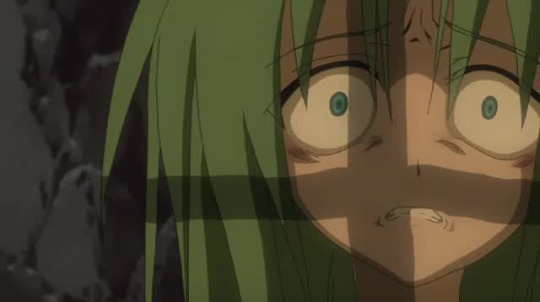
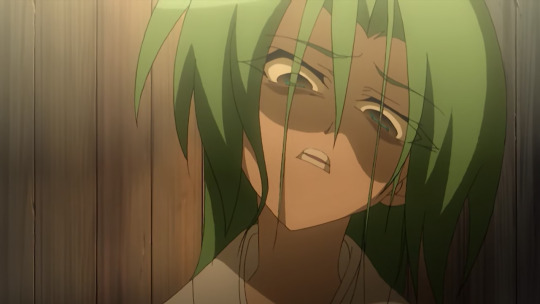
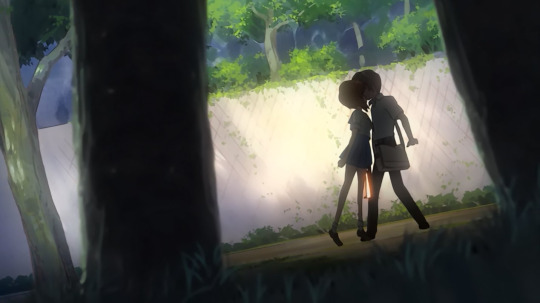
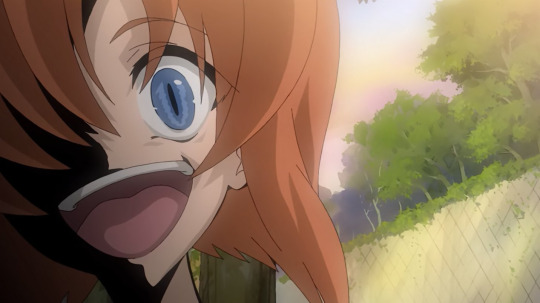
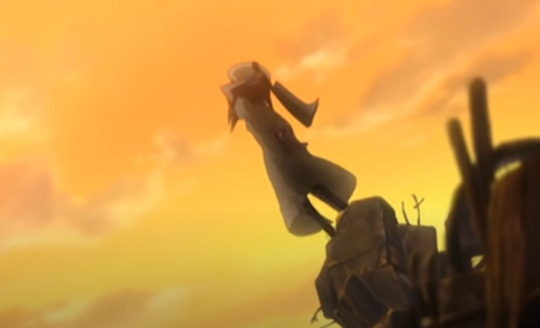

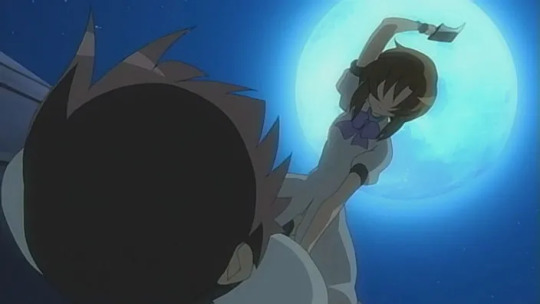

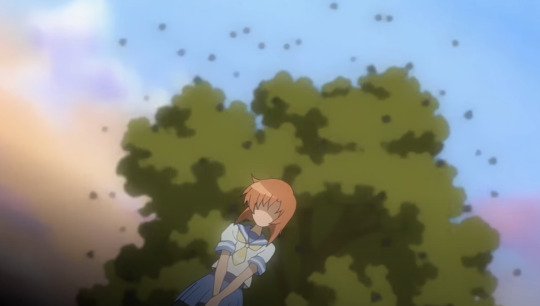

It's an interesting looking show! And it genuenly has a great atmosphere. If you're wondering what I mean, I think all you need to do is just watch the 2006 version of the "You're lying!" scene and compare it to the 2020 version from Higurashi Gou (sequal/remake series).
While yes, the 2020 version has cleaner smoother animation, the 2006 version in my opinion is more tense. The shot composition makes the scene feel urgent, and there's little extra touches the 2020 version doesn't have that makes it more impactful (Rena's scream of "You're lying!" making birds fly away from a tree behind her, not only creating an iconic shot visually, but incorporating further sound design to elevate the scene).
Circling back, but the Umineko anime is so unbelievably incompetant. It's not only a bad adaptation, but it's a bad show period. It's hard to follow and confusing unless you are familiar with the source material, and it's just such a surface level adaptation that's trying to recreate what Higurashi's anime adaptation did, but failing. It's extremely uninspired. Higurashi's anime adaptations often get criticized for their overuse of gore (to a point it mischaracterizes the series as just violence with no substance) and while that is a fair criticism, Higurashi still let us spend time with the characters a little before the murders start. The Umineko anime gives us half an anime episode of chill, before the drama begins, and only 2 anime episodes before the full on horror begins. We can't get emotionally attached to 18 characters in the span of two 20 minute episodes. Like that is impossible. Also the colors are flat and dull with nothing to offer, the animation isn't the best but that would be ok if it idk- gave us ANY iconic shots. The only good thing about the Umineko anime adaptation is just the opening and ending songs and mby the artstyle.
Also I don't want to hear any of you saying Umineko is impossible to adapt, when the Stageplay managed to do such a good job of adapting it into a shorter format and different medium.
Anyhow again, how are these two anime directed by the same person. I don't get it I rly don't!
85 notes
·
View notes
Text
Not to mix together two hyperfixations of mine that have literally nothing to do with one another but to me Sparrow is a very good character to analyze through the "without love, the truth cannot be seen" framework that Umineko presents. Your understanding of his actions and words is framed entirely by whether you feel love for his character or not, which might sound obvious but what I mean is that to understand his relationship with his children, especially Normal, it is necessary to keep the circumstances of Sparrow's own childhood in mind - only then can you see the full picture. This, however, implies a level of care and nuance that is probably only granted by those who already have an attachment to the character, and that's why some listeners have fallen into the belief that Sparrow didn't love Normal (at least, not as unconditionally as he could've) despite canon evidence pointing to the contrary. Without >taking the time to analyze Sparrow in-depth< (Love), >his real feelings for his children< (The Truth) cannot be seen.
And, ultimately, I think this is why Sparrow and Normal's relationship is unfixable from an in-universe perspective. Still (validly) stuck with the image of his father telling him he's not proud of him, Normal sees Sparrow's support of him as limited and conditional, which biases his perspective against him - in other words, Normal does not truly feel loved by him. In turn, and whether it's subconscious or not, this makes Normal perpetuate the vicious cycle by being unable to view his father through a lens of Love due to his resentment. He interprets Sparrow's words and actions in unfavorable manners because he, himself, is depriving them of nuance and context. Because of this, he will never be able to reach The Truth.
Umineko also proposes the idea that if someone believes in a lie too fervently, it stops being a lie and becomes The Truth. Sparrow and Normal cannot find connection because they now fundamentally exist in two different realities, each one with a different Truth. And The Truth for Normal now is, unfortunately, that it took risking his life multiple times and losing people important to him for his father to be proud.
#is this anything#meta#character analysis#dndads#normal oak#sparrow oak-garcia#sparrow oak#this is genuinely less of a dndads analysis and more me just admiring the framework umineko provided me to understand human relationships#as a neurodivergent who is very very bad at it#i feel like i kinda worded this as a pity party for sparrow but know i believe normal is 100% valid in feeling how he feels#posts that are made for me only bc the intersection between dndads fans and umi fans is literally Just Me probably#post so wordy you have to bring out the Proper Grammar as to not confuse the mooties
20 notes
·
View notes
Text
The fact that they just... hang out.
Rosa just woke up with a spare kid she killed but now its fine and she is a single mother of two. How many kids are waiting to claim Rosa as their mom in the wild meta world....
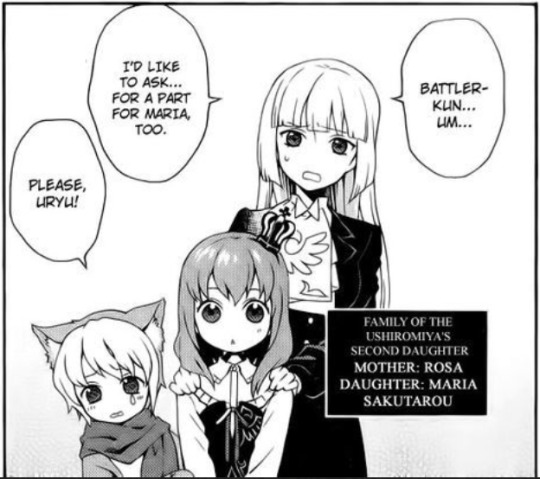
#she actually does give birth by immaculate conception unfortunately for her#all of maria's toys waiting in the meta like 'MAMA :3'#umineko#umineko spoilers#umineko posting#rosa ushiromiya#umineko no naku koro ni#nana is posting#umineko tsubasa
41 notes
·
View notes
Text
I've spent a good amount thinking about Ikuko Hachijo = Sayo Yasuda theory, but not from the point of whether it has basis in canon or not (there are some strong nods that could be interpreted as hints; as much as there are some contradictions to it), but from the perspective of how it would recontextualize the entire finale of the VN. And to be honest, I'm not sure whether I myself would fully subscribe to this theory, because both point of view make a cohesive interpretation of the story itself
1. Ikuko isn't Sayo
So it just would be as taking Ikuko/Featherine's character and purpose at face value - a sort of the author's self-insert who is an outsider of the story and who literally and metaphorically gives the reader a chance to make the final choice. These types of character are expected in sich a multilayered work as Umineko
So in the final episode she was revealed as someone who was helping Tohya process Battler's memories through making the forgeries. In a sense, the forgeries are Battler's journey to Beato's heart, and in the end, after facing various oddities, the Battler "piece" that was locked in Tohya reunited for good. Incidentally, the manga's final frames illustrate that better: there is meta-Bettler (the one who drowned together with Beato) and the Tohya/battler who fuse into one on the end
In a similar vein, it's also interesting to think about what's going to happen with Tohya himself after the party in Gospel House. Will his new and old selves be finally at peace (logically, it would mean a some degree of the recovery)? Will he be starting to gradually his Battler's memories (this is more of a pro-magic explanation, but no problem about that, it's the magic ending after all)? Will he suddenly die just there (this one is a rather gritty scenario, considering the sequence takes place in an orphanage with a hall full of kids)?
But anyway, ultimately, the whole story was about understanding the story and the main character behind it. So Ikuko/Featherine, at least in some form, was an intuitive way to make some sort of a foothold - both for Ange (the other outsider who wants to understand the story) and the reader. They gave the name Virgilia to a wrong character, heh
2. Ikuko is Sayo
With few tweaks there can be made a case that, much like Tohya, Sayo survived the drowning. Taking a new name and appearance (wouldn't be the first time for her), acquiring a house and servants (she's super-rich) she really could trick Tohya/Battler into thinking she is an unrelated person. But why would she do this?
Well, first of all, being together with Battler and discussing mystery novels was her dream. There's a big but about that, because it just couldn't be the same way she imagined in her childhood - it was accentuated that Tohya and Ikuko have platonic relationship, and that may be because she doesn't want Battler to "know the truth about her cursed body". Despite her self-doubt, it really could be that Battler's words in the boat scene were heeded, and Sayo reconsidered her stance, leaving her self Beatrice dying instead, probably as a way to finally put behind her past.
In this case the meta-narrative is still working, since now it's both Beatrice and Battler become some metaphorical figures in the Forgeries, both abandoned by their bodies/shells. The forgeries are still meant to help Tohya to come in terms with his memories and losing Ange (like meta!Ange's death in ep4 was tied into her disappearance in 1998)
This is a less tragic and more positive ending for Sayo, and I don't really think that she doesn't deserve it. Among other reasons this is why I think the Ikuko=Sayo theory has some merit
So, I'm not really sure? Battler finding (and fighting through) the way back to Beatrice is a very beautiful narrative for a sucker for angsty romance such as me, but the idea of them also having at least some resemblance of contentment on a more mundane level is pretty attractive too
#umineko#umineko spoilers#meta#ikuko hachijo#tohya hachijo#battler ushiromiya#beatrice the golden witch#beabato#<- i wrote this entire post purely because i love them sm
22 notes
·
View notes
Text
Guy who has recently read Umineko, reading The Flower that Bloomed Nowhere: Getting a lot of 'Umineko' vibes from this...
#oh youve gone from being an observer to a meta-hero? you have to figure out who/how/whydunnit across time loops?#immediate anecdote about grief and what truth people focus on after death?#aeroplanes talking#umineko#tftbn
15 notes
·
View notes
Note
how do you get so good at analysis? ;_; i'm really dumb and take things at surface value, which i've been fine with up until now but seeing you read umineko so deeply makes me kinda like.... jealous isn't the right word? that sounds too spiteful. it just makes me feel like i'm missing out on a more fun way to experience things. but it seems so daunting i don't even know how to start. to me it seems like picking out every detail and exaggerating it as far as possible but it's obviously more refined than that because you're able to keep things together thematically and make some good theories. do you have any advice for it?
Hi, anon!
Don’t worry, I don’t think you’re being jealous/spiteful with this ask. I also used to want to write analysis on things because they seem fun, and actually this is my first proper try at it! I think I’ve said it before but if I’m not careful I’ll binge everything on first watch/read and miss details. (This is why I rewatch Utena every other month). So yes, I know sometimes I’m grasping at straws but that’s because I’m actively squeezing everything I can out of a page/scene.
I think what sets this liveblog apart and the reason I can pick up threads/themes is that Umineko seems very upfront about what it wants to say.
「MORE THAN ANYTHING ELSE, EVERYONE WANTED A LOT OF MONEY RIGHT NOW…!」
Utena is the same in that - even though people say it’s too symbolic - I think the fact that it bares its inner mechanisms for all to see is a huge kindness. If everything means something else, or represents both itself and a larger concept, then a show where everything is allegorical is actually discarding layers of obfuscation.
I think a good place to start to Notice Themes is at the very beginning.
The Golden Witch invites you to take things easy and accept them as they come, but The Revolutionary Witch tells you that - in any story - the first introductions matter the most.
Up until now, Umineko has drilled inside our heads again and again, repetition after repetition, that the Ushiromiya’s Western schtick is a product of Kinzo’s reverse weeb affectations. He started many of the “traditions” that seem so inescapable, he invented the name for the fucking chair he sits at the breakfast table and the order of the seats according to his own patriarchal standards.
His Western obsession is tied very obviously with his “black magic” obsession and he even gets angry when you don’t call them “grimoires” because part of the charm of magic is that it’s foreign and cool. He speaks of black magic when ranting about his urges to sexually abuse a dead Beatrice, all his children speak of Western things when recalling their own childhood and abuse.
The only exception to this is Kinzo’s Japanese sword - both a true object and a phallic symbol that doesn’t deny itself its origins - that he uses to spank Jessica’s naked butt.
I feel like, in Umineko, you just need to sit and listen to the characters and wonder at their motivations. But you also need to wonder about the choice of presentation.
For example, Kanon alone in the garden after he left the conversation, being dismissed by Gohda. All he says is “…even me” or something among those lines, very mysterious! But the way this is presented, the camera not caring about the Cousins + Adults but following an actor after he’s being kicked out of the stage? Unusual! Curious! Very interesting! The way the narrative describes it, (paraphrasing here) “you needed to get closer if you wanted to hear the words whispered to his heart”? Why would it be written like that? Who is the narrator speaking to?
So I think - to make an analysis close in methodology to what I’m doing - you need to question what’s onscreen, not in a “this isn’t real” way (it may not be real but that’s not the focus!), but in a “why is this being shown the way it is” way. This is a novel after all. Choices of words, choices of POV, what is described and what’s left unsaid!
Those are the tips from the Revolutionary Witch!
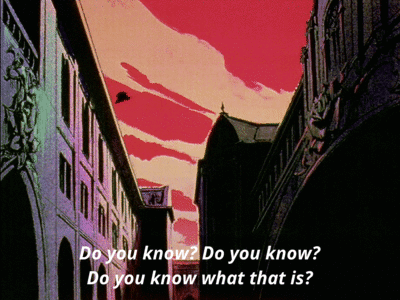
— Rose, the Revolutionary Witch
22 notes
·
View notes
Text

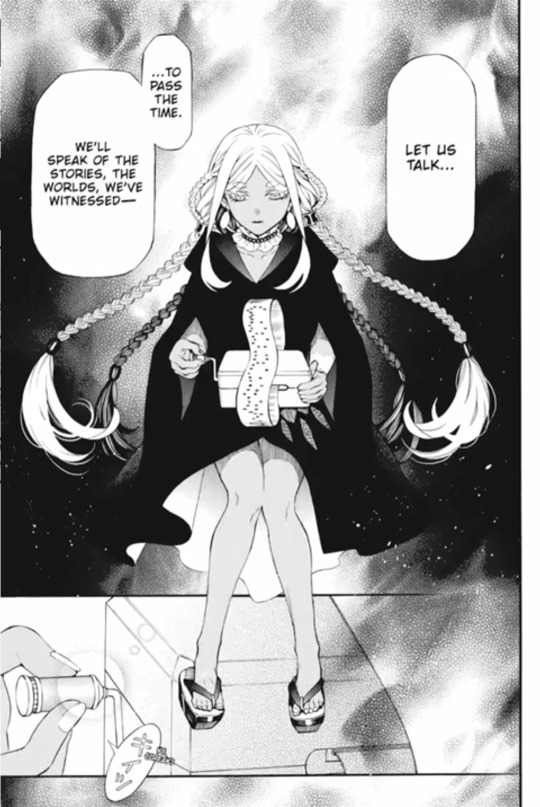
Getting Umineko vibes from these two pages
#if you like mystery mixed with meta commentary on the nature of stories please read umineko. if the vn is too long (it is) read the manga#thank you i'm sorry#vanitas no carte#vnc 58#vnc spoilers#this has been a post
38 notes
·
View notes
Text
I have so many thoughts on Outcore.
It's a Funny Meme Game. It does wild meta shenanigans. It has really shallow pop culture references. The soundtrack parodies are incredibly spot-on. It has a particular really stupid running gag which ends up being a buildup to pointed commentary about certain pop culture.
(Seriously, the second boss theme is clearly a parody of a particular Undertale song, and it sounds exactly like it despite being completely different in every detail. Also an "anime-style" song I can seamlessly transition in my head into multiple unrelated anime themesongs.)
Also Hella Yuri's hamfisted description would be like "female protagonist, you can choose to romance a female character", y'know like how they described LambdaBern in Umineko as "two important side characters are in a lesbian relationship".
And the game as a whole goes into slightly eldritch places, too.
Bottom line: this game is incredibly stupid, 10/10. It's left me feeling creatively inspired in the best way, damn.
#meta#shenanigans#meta shenanigans#game recommendations#game review#outcore#wlw#hella yuri#umineko#lambdabern#lambdadelta#bernkastel#let's ruin video games#eldritch awesome#eldritch
38 notes
·
View notes
Note
I know jack shit about that dahlia character from ace attorney but she feels like a umineko character that got displaced, like the opposite of an invasive species, like you take this species that was supposed to survive in a rain forest and put them in a desert and they die immediately
RIGHT??? dahlia would have been treated so well in umineko. she has butterflies around her, a memorable appearance, great acting skills, huge trauma, ..... she should have been at the witches tea party!!!!!!
#dahlia let me take you to the meta world of umineko. you would be the witch of abandonment or something#raysanswers
9 notes
·
View notes
Text
Metafiction in visual novels is interesting because it’s a very novel, cool, amazing concept when you’re first introduced to it, but as you consume more and more of it, it all starts to feel sort of repetitive and dull? Does every other VN need to have some meta element to it? This is specifically because so many of them throw all of their eggs into the “metafiction basket” and expect that single element to carry their work and make it interesting all on its own without actually trying to create something meaningful or new with it - or it just feels like a hamfisted and unnecessary inclusion.
But despite my general skepticism when it comes to works that seem to go in too hard on a meta gimmick now, the ones that actually use it as a tool to enhance the rest of the story are the reasons why it’s still one of my favorite tropes. Whether it’s as a love letter to the medium of visual novels like Totono, a very personal deep dive into mental health like Milk Inside a Bag of Milk Inside a Bag of Milk and its sequel, different approaches to the relationships stories have with the author/reader like in Subahibi and Umineko, or a unique exploration of what makes up an individuals “self” as in Remember11. I still adore the works that use meta storytelling as a way to elevate their ideas to a whole another level.
#meta#metafiction#visualnovel#remember 11#umineko#subahibi#totono#kimi to kanojo to kanojo no koi#milk inside a bag of milk inside a bag of milk
47 notes
·
View notes
Text
I disagree when ppl say Umineko couldn't work in anime format. It would be difficult to adapt but not impossible. The stageplay proves it's possible to summarize Umineko without losing quality. The only problem is it would be very difficult to get funding.
Objectively speaking, if the stageplay is anything to go by, to adapt an EP of the VN, you'd need at least 3 hours aka 9 anime episodes. So we're looking at at least around 70 episodes. This might have been possible in the 2000s, but these days it's rare to come across a recent anime this long.
Unless it's extremely successful, most anime sit around 12 episodes (24 if they are lucky). An Umineko anime would be a huge gamble and I don't think any studio would be willing to take it considering how infamously bad the previous adaptation is. If I were Ryukishi I'd invest in a live action drama honestly. 😭
It would be way cheaper to produce. Even with the magic scenes, occassional special effects are still WAY cheaper then 2d animation. All you'd rly need to do is get a rly good director, rent a few locations, find some great actors, and have an sfx budget. BOOM! Solid Umineko adaptation.
The problem is I think Ryukishi really wants an anime for Umineko, and I get it- I do too. But It's not realistic atm. Even if Silent Hill f breaks all records and earns a ton of money, I doubt it would be enough to fund a 70+ episode anime with consistently good animation.
11 notes
·
View notes
Text
been talking abt it with a friend today so i'm curious how people interpret the metaverse and also the forgeries from a more mystery/real world angle etc. long (oops) so i'm cutting it
for example: i don't think the metaverse debates (i.e. parlor scenes) feature in the forgeries, by which i mean forgery = the in-universe stories sayo and tohya write. i also don't think ange features much in the forgeries either, tohya writing ange dying the gruesome death that she does in ep4 doesn't really make sense to me. nor does tohya having ange feature in ep7 the way that she does make sense to me either. also he obviously couldn't interpret anything from maria's diary so that means all of the maria sections in ep4 have to be explained through ange.
my friend n i were discussing it and sort of agreed that ep3 is like where ange starts to insert herself into the stories. girl is HIGHLIGHTING and UNDERLINING and writing "STUPID ONII-CHAN" in her printed copy of ep3 and that's how she features in the meta elements. and as she begins to sort of explode and unravel the truth she continues to slip and insert herself into the stories that ikuko and tohya publish. i know i just said she was highlighting and stuff but this doesn't necessarily have to be via annotating but rather mentally. i just think it is funny to imagine her going ham with a highlighter like "HE WOULD NOT FUCKING SAY THAT!!!!"
ep7 could easily just be a secret copy that ikuko gives ange without tohya's permission because i don't think he would ever publish something like that; this could also be why featherine features so strongly as an antagonist in ep7 for both BATTLER and ange, because maybe ikuko went behind tohya's back and gave the book that he intended to be a pure dream for the dead sayo to ange so she could learn the truth about what happened, and of course ange would instinctively hate the person who tells her that her parents killed everyone. and i don't really think that tohya would write the woman who took him in/his roommate as like an evil witch who is on purpose getting in the way of ange finding happiness. (parallels of ikuko to beato's role in ep8 go here?)
finally, i don't think of ep8 as an in-universe story at all, except maybe perhaps it could be a story ange writes for herself in her journal that then leads to her realizing how much she loves writing and wishing to share her heart with people as a children's book author. i guess this could also explain why the gameboard in this one features a child ange and why this translates to her wanting to write books for children. TT_TT
i'm beginning to ramble but tl;dr i think anything metaverse could maybe be explained by someone "alive" injecting themselves into the stories already written. this could be tohya reading ep1 and ep2 for the first time and struggling with the thoughts of battler resurfacing. i think the only episode that is actually a perfect 1 to 1 of a forgery is ep1. other than that, the forgeries and the episodes are not the same.
curious to see what other people think ^^ if i've made a post like this before mb i just feel like my interpretation is always shifting with this stuff so it's fun to hear what other people have to say about it too.
i also keep seeing people making comments about how they're mad that all the episodes are just in-universe stories and so i thought to myself "do these people really think that everything in the episodes was 100% written down on paper as a story?" because i don't think that at all
ik i said this at the beginning of the post but bear in mind also this is me asking from a real world pov/mystery pov not a fantasy one.
#red truth#meta#umineko spoilers#theories#idk why i made a meta and theories tag when the two are kind of the same but watever.#ive had this blog since 2017? tags are gonna be redundant sometimes.
5 notes
·
View notes
Note
It’s actually erika’s whole plan to trap battler, since she knows that battler wanted to claim that victims where not really dead, now he cant do that because he would be breaking the knox law
no i'm fully aware of that. i'm not saying erika is dumb. i'm saying the fact that this is what the plot did is dumb. dumb dumb stupid dummy dumb
#as someone correctly pointed out to me its dumb that erika gets the advantage of meta knowledge and can trap batora on that#when batora's piece didn't have that ability#it feels kind of lame#and i'm not even opposed to the logic error itself!#i like batora being stuck in locked room hell a lot actually!#i made a whole post cackling about it#it just felt kinda eh to do it this way. like bad like not good#uminexus#umineko spoilers
4 notes
·
View notes